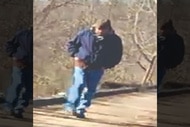Judge Wants Robert Durst’s Testimony, Which Has Now Exceeded 60 Hours, Wrapped Up
Superior Court Judge Mark Windham noted that Robert Durst has spent 24 hours answering questions from his defense lawyer, and another 38 hours of cross-examination.

The judge in the Robert Durst trial warned lawyers from both sides to wrap up their questioning of the accused killer this week.
Superior Court Judge Mark Windham noted on Wednesday that over the past 10 days, Durst has spent a total of 24 hours being questioned by lead defense attorney Dick DeGuerin, and will have sat for another 38 hours during cross-examination by Prosecutor John Lewin by the end of the week, according to the Los Angeles Daily News.
“So, I would think the following is true. First of all, the defendant’s testimony was not credible,” the judge told the two attorneys after jurors were excused for the day, according to the Daily News. “Secondly, on day one, it appeared that you really effectively destroyed any possible credibility of this witness. … At some point, there’s a limit. It doesn’t seem there’s any further purpose. It seems additional questioning would be an undue consumption of time.”
Lewin asked for permission to wrap up by Monday.
Durst is currently on trial for the 2000 murder of his friend Susan Berman.
Last week he testified that he regrets his decision to participate in “The Jinx,” an HBO documentary that has become part of his trial. Durst testified that appearing in the 2015 docuseries was a “very, very, very, big mistake,” The Wrap reported.
In 2015, he was arrested in connection with Berman's death, just one day before the finale of "The Jinx" aired. The docuseries captured Durst on a hot mic while using the bathroom after a contentious interview with the filmmaker.
He apparently mumbled to himself that he was “caught” and that he was having difficulty with the questions. He said the phrases “Killed them all, of course” and "What the hell did I do?” While the filmmakers edited his mumblings, they provided the full clip to police. That audio played in its entirety for jurors in 2020 before COVID postponed the trial.
Prosecutors say Durst, 78, shot Berman execution-style because she had information about the disappearance of Durst's first wife, Kathleen McCormack Durst. Kathleen’s body was never found but she was declared legally dead in 2017.
Durst has also recently admitted on the stand to lying about his life and said he might lie again about “certain very important things.”
This seemed to include whether or not he killed Berman.
“I did not kill Susan Berman,” he testified. “But if I had, I would lie about it.”
He insisted his testimony had been truthful, but fessed up to previous fabrications. He admitted that he did lie to police in 1982 about his wife Kathleen calling him from her apartment in Manhattan the night she was last seen alive, meaning that she had been safe when she allegedly left the couple's home before vanishing. He said the lie was meant to get detectives off his back.
Furthermore, he admitted on the stand to lying in the past about the so-called "cadaver note" written to police to alert them to Berman’s body. While he denied writing it in the past, including famously to filmmakers of “The Jinx,” he confessed on the stand that he was the penman. He said he wrote it out of panic after discovering Berman's dead body, believing that if he had simply called authorities, they would recognize his voice and think he was responsible.
He also recalled in court how he wore a wig and fled to Texas to hide from Jeanine Pirro, who was then district attorney for Westchester County, in 2000 after she announced her plans to reinvestigate his wife’s disappearance. Berman was killed two months later. Less than a year after Berman's murder Durst shot his neighbor Morris Black to death before disposing of his dismembered remains in Galveston Bay. He was still hiding out in Texas at the time, posing as a mute woman. Durst claimed he shot Black in self-defense and he was acquitted of murder in 2003. He pleaded guilty to tampering with evidence and bail jumping a year later.
When he was arrested for skipping bail, he had taken on another disguise: he shaved his hair and eyebrows to avoid being recognized. He was sentenced to five years with credit for time served. He was paroled in 2005.

























